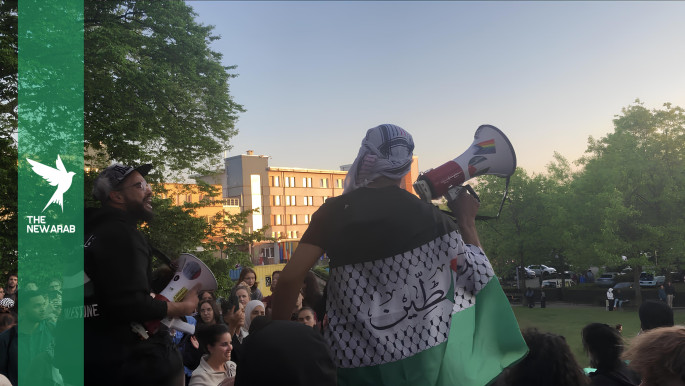On Thursday, 7 August, 35-year-old Mohammed Khatib learned that his refugee status in Belgium was being revoked — allegedly over his verbal support for Palestinian armed resistance and alleged links with international terrorism.
Khatib is the Europe coordinator of the Palestinian Prisoner Solidarity Network, Samidoun. A Palestinian himself, he co-founded the organisation in 2011 after fleeing to Belgium from Lebanon in 2010, where he had grown up in the Ain El Hilweh refugee camp.
The decision to revoke his refugee status follows a campaign labelling him a “hate preacher,” initiated by the Belgian far-right on social media and taken up by former State Secretary for Asylum and Migration Nicole De Moor, who announced a procedure against him in October 2024.
The case, overseen by the Commissioner General for Refugees and Stateless Persons (CGRA), is based on information collected by the Coordination Unit for Threat Analysis (CUTA), which classifies Khatib a “serious” security threat.
However, the evidence supporting this claim has not been made public, nor is it accessible to Khatib.
“If they had something against me, I would be in prison,” Khatib told The New Arab, denying all accusations of hate speech.
He says he will appeal the decision before the Council for Immigration Litigation (CCE). If rejected, he will either be deported — an uncertain prospect, given that Palestinians are not permitted to return to Israel and, as a Palestinian born in Lebanon, he does not possess Lebanese citizenship — or remain in Belgium without basic rights.
Mohammed Khatib is the European coordinator for Samidoun, a global Palestinian prisoner solidarity network
“This dangerous development threatens not only Mohammed, but all Palestinians in Belgium who are active and involved in the struggle to end the ongoing Zionist-imperialist genocide in the Gaza Strip and throughout occupied Palestine,” Samidoun said in a statement. “Refugee status is not something the State can give and take as a reward or punishment.”
Asylum and Migration Minister Anneleen Van Bossuyt declined to comment on the individual case but confirmed her support for the decision.
Migration lawyer Selma Ben Khelifa described the development as “anti-democratic” and said it revealed a lack of independence within the CGRA, given the political nature of the file.
“If they had evidence against him, they could prosecute him and he could defend himself in court,” she told The New Arab.
The CGRA does not comment on individual cases. While the Minister for Asylum and Migration may initiate proceedings to revoke international protection, they may not intervene in the investigation itself. Refugee status may only be revoked where there is proof of a serious crime.
Kurdish parallel
Ben Khelifa previously represented a Kurdish national who was granted international protection in Belgium in 2013.
In 2021, his refugee status was revoked over his support for the Kurdistan Workers’ Party (PKK), which is considered a terrorist organisation by the EU.
However, the CCE overturned the decision in February, concluding that support for the PKK alone was “insufficient evidence to consider the applicant a danger to national security.”
According to Ben Khelifa, Khatib’s circumstances are similar, and the government knows its claim is weak.
“This is a form of administrative harassment designed to block his political activity. They have seen the case law, and they know they can’t win, but there will be a chilling effect on activism nonetheless,” she explained.
A Samidoun ban underway?
The decision regarding Khatib’s status comes as Belgium signals its intention to ban Samidoun altogether. Just days earlier, a draft law was introduced in Parliament to ban so-called “extremist” organisations.
Any group deemed to pose a “serious and persistent threat that cannot be neutralised” would face dissolution, under what Interior Minister Bernard Quintin has described as a “zero tolerance” approach to radicalism. The official coalition agreement, signed in February, explicitly names Samidoun as a target of the bill.
The United States and Canada classified Samidoun as a “terrorist” organisation in October 2024 and accused it of being a “sham charity” for the Popular Front for the Liberation of Palestine (PFLP).
Germany banned the organisation in October 2023 for “glorifying” the October 7 Hamas attacks in Israel. Samidoun has denied the first allegation, but Khatib did not deny the second because he considers the attacks “justified resistance.”
Protests and arrests
Khatib was arrested in April for reasons that remain unclear, after attending a protest in Brussels city centre.
At the time, refugee and immigration lawyer Benoit Dhondt said his arrest was being used as a “propaganda tool” to instil fear in those speaking out against the genocide in Gaza, where over 61,000 people have been killed by Israel’s offensive since October 2023.
An Amnesty International report published in July warned that administrative arrest “is increasingly used to prevent people from participating in protests” in Belgium.
Riot police move in to disperse a protest in May 2024 [Ciara Carolan]
Other instances of repression include the interrogation of 70 people who participated in or sympathised with an ULB campus occupation calling for the university to cut ties with Israel. They were questioned last September for “inciting segregation and racism.”
CUTA has also listed Anuna De Wever – known as ‘Belgium’s Greta Thunberg’ – as a threat to national security after the 24-year-old climate activist spraypainted the words ‘Stop Genocide’ on a building belonging to OIP Sensor Systems, a daughter company of Israel’s largest arms supplier Elbit Systems.
“The daily stream of images of massacres is the only story,” said De Wever, referring to footage coming out of Gaza. “Everything else is just a distraction.”
An attack on all refugees
Khatib argues that the campaign against him is part of a wider attack on refugees — not just Palestinians.
The Belgian Government is currently implementing the “strictest migration policy Europe has seen,” according to Prime Minister Bart De Wever.
There are over 12,000 rulings from Belgian and European courts condemning the state for failing to properly accommodate applicants for international protection. A labour court imposed a daily penalty for non-compliance with these rulings in June 2023, but the fine remains unpaid.
The Council of Europe, Europe’s largest human rights body, has repeatedly condemned Belgium for its “clear refusal” to comply with international law.
“If this rule is applied to me, the government would be able to revoke the refugee status of any refugee with a political opinion it doesn’t like,” says Khatib. “It’s an attack on all migrants, and especially refugees in Belgium, at a time when thousands are undocumented, without shelter and without rights.”
In an open letter, Another Jewish Voice — a Flemish-Jewish organisation advocating for peace in Israel-Palestine — called the move to revoke Khatib’s refugee status a “politically motivated decision.”
“A recognised refugee is someone who undergoes a strict procedure to prove that their life or dignity is at risk,” the group stated. “Revoking such recognition on political grounds jeopardises the safety and well-being of all refugees.”
Ciara Carolan is a Brussels-based journalist reporting primarily on human rights. She has written for Al Jazeera, the Irish Independent, and The Brussels Times
Follow her on X: @ccarolan01


